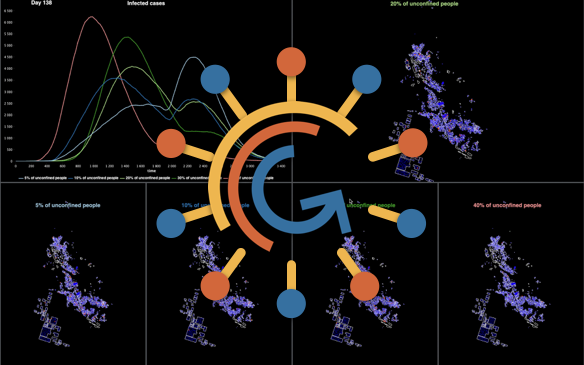Public health policies implemented against the CoVid19 pandemic raise a number of questions.
The Institut de recherche pour le développement (IRD) in Vietnam has set up a multidisciplinary team of researchers from its research units UMMISCO, MIVEGEC and DIADE, assisted by colleagues from Thuyloi University, Can Tho University, INRAE and SPH-HKU, to design a realistic spatial computer model called COMOKIT, on the GAMA modeling and simulation platform.
With the support of ANRS (ANRS COV23 COMOKIT) and EDF R&D.
COMOKIT aims at supporting deciders in answering the most pressing of these questions using an integrated model that combines:
- A sub-model of individual clinical dynamics and epidemiological status
- A sub-model of direct transmission of the infection from agent to agent
- A sub-model of environmental transmission through the built environment
- A sub-model of policy and interventions design and implementation
- An agenda-based model of people activities at a one-hour time step
The base model represents the spread of COVID-19 and the impact of control policies at the scale of a commune (~ 10.000 inhabitants) using:
An Agent-Based approach: Each inhabitant is represented individually with his/her specific characteristics (age, sex, household), clinical state and daily activities based on a generated agenda
A Flexible Policy representation: An Authority agent can be programmed to apply public health control policies consisting of a combination of mitigation measures and interventions.
Numerous Realistic Scenarios: Each set of parameters (incl. the policies applied) represents a scenario, which can be explored by executing several simulations and compared against other scenarios in more elaborate experiments.
More information of COMOKIT are available on the official website: https://comokit.org/






